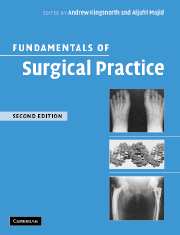Book contents
- Frontmatter
- Contents
- Preface
- Contributors
- 1 Preoperative management
- 2 Principles of anaesthesia
- 3 Postoperative management
- 4 Nutritional support
- 5 Surgical sepsis: prevention and therapy
- 6 Surgical techniques and technology
- 7 Trauma: general principles of management
- 8 Intensive care
- 9 Principles of cancer management
- 10 Ethics, legal aspects and assessment of effectiveness
- 11 Haemopoietic and lymphoreticular systems: anatomy, physiology and pathology
- 12 Upper gastrointestinal surgery
- 13 Lower gastrointestinal surgery
- 14 Hernia management
- 15 Vascular surgery
- 16 Endocrine surgery
- 17 The breast
- 18 Thoracic surgery
- 19 Genitourinary system
- 20 Head and neck
- 21 The central nervous system
- 22 Musculoskeletal system
- 23 Paediatric surgery
- Index
10 - Ethics, legal aspects and assessment of effectiveness
Published online by Cambridge University Press: 15 December 2009
- Frontmatter
- Contents
- Preface
- Contributors
- 1 Preoperative management
- 2 Principles of anaesthesia
- 3 Postoperative management
- 4 Nutritional support
- 5 Surgical sepsis: prevention and therapy
- 6 Surgical techniques and technology
- 7 Trauma: general principles of management
- 8 Intensive care
- 9 Principles of cancer management
- 10 Ethics, legal aspects and assessment of effectiveness
- 11 Haemopoietic and lymphoreticular systems: anatomy, physiology and pathology
- 12 Upper gastrointestinal surgery
- 13 Lower gastrointestinal surgery
- 14 Hernia management
- 15 Vascular surgery
- 16 Endocrine surgery
- 17 The breast
- 18 Thoracic surgery
- 19 Genitourinary system
- 20 Head and neck
- 21 The central nervous system
- 22 Musculoskeletal system
- 23 Paediatric surgery
- Index
Summary
If surgeons are to be more than highly trained technicians, they must have an understanding of the wider issues which affect the practice of surgery. The discipline of ethics allows surgeons to examine and justify their actions in relation to accepted standards of moral behaviour and a knowledge of the law as it affects medical practice is essential if they are to remain within the legal boundaries of practice. In order to fully debate the ethical and legal implications of surgical practice, a solid grasp of the scientific evidence behind it is necessary. Surgeons must know that their actions will benefit the patient in the long term and this requires an understanding of statistical methods, including clinical trial design and interpretation which is the basis for the current emphasis on evidence-based medicine. This chapter, somewhat improbably, attempts to give an overview of these themes. Wider reading on each of the themes is recommended and suitable starting points are suggested in the reading list.
ETHICS AND MEDICINE
There is an increasing emphasis in society on the rights pertaining to particular groups and individuals. On joining the medical profession the doctor accepts a number of duties which are defined and debated under the heading of medical ethics. Traditionally, these duties were regarded as taking precedence over the doctor's own rights.
- Type
- Chapter
- Information
- Fundamentals of Surgical Practice , pp. 184 - 198Publisher: Cambridge University PressPrint publication year: 2006

